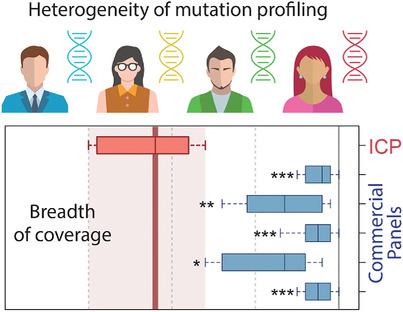Our official English website, www.x-mol.net, welcomes your
feedback! (Note: you will need to create a separate account there.)
Tracking Neoantigens by Personalized Circulating Tumor DNA Sequencing during Checkpoint Blockade Immunotherapy in Non-Small Cell Lung Cancer.
Advanced Science ( IF 14.3 ) Pub Date : 2020-03-26 , DOI: 10.1002/advs.201903410 Qingzhu Jia 1, 2 , Luting Chiu 3 , Shuangxiu Wu 3 , Jian Bai 3 , Lina Peng 1, 2 , Linpeng Zheng 1, 2 , Rui Zang 1 , Xueqin Li 1 , Bibo Yuan 1 , Yixing Gao 1, 2 , Dingyong Wu 1 , Xiaohong Li 1 , Lin Wu 3 , Jianguo Sun 1, 2 , Ji He 4 , Bruce W S Robinson 5, 6 , Bo Zhu 1, 2
Advanced Science ( IF 14.3 ) Pub Date : 2020-03-26 , DOI: 10.1002/advs.201903410 Qingzhu Jia 1, 2 , Luting Chiu 3 , Shuangxiu Wu 3 , Jian Bai 3 , Lina Peng 1, 2 , Linpeng Zheng 1, 2 , Rui Zang 1 , Xueqin Li 1 , Bibo Yuan 1 , Yixing Gao 1, 2 , Dingyong Wu 1 , Xiaohong Li 1 , Lin Wu 3 , Jianguo Sun 1, 2 , Ji He 4 , Bruce W S Robinson 5, 6 , Bo Zhu 1, 2
Affiliation

|
The evolutionary dynamics of tumor-associated neoantigens carry information about drug sensitivity and resistance to the immune checkpoint blockade (ICB). However, the spectrum of somatic mutations is highly heterogeneous among patients, making it difficult to track neoantigens by circulating tumor DNA (ctDNA) sequencing using "one size fits all" commercial gene panels. Thus, individually customized panels (ICPs) are needed to track neoantigen evolution comprehensively during ICB treatment. Dominant neoantigens are predicted from whole exome sequencing data for treatment-naïve tumor tissues. Panels targeting predicted neoantigens are used for personalized ctDNA sequencing. Analyzing ten patients with non-small cell lung cancer, ICPs are effective for tracking most predicted dominant neoantigens (80-100%) in serial peripheral blood samples, and to detect substantially more genes (18-30) than the capacity of current commercial gene panels. A more than 50% decrease in ctDNA concentration after eight weeks of ICB administration is associated with favorable progression-free survival. Furthermore, at the individual level, the magnitude of the early ctDNA response is correlated with the subsequent change in tumor burden. The application of ICP-based ctDNA sequencing is expected to improve the understanding of ICB-driven tumor evolution and to provide personalized management strategies that optimize the clinical benefits of immunotherapies.
中文翻译:

非小细胞肺癌检查点阻断免疫治疗期间通过个性化循环肿瘤 DNA 测序追踪新抗原。
肿瘤相关新抗原的进化动态携带有关药物敏感性和对免疫检查点阻断(ICB)的耐药性的信息。然而,患者之间的体细胞突变谱具有高度异质性,因此很难使用“一刀切”的商业基因组通过循环肿瘤 DNA (ctDNA) 测序来追踪新抗原。因此,需要单独定制的面板 (ICP) 来全面跟踪 ICB 治疗期间新抗原的演变。主要新抗原是根据未接受治疗的肿瘤组织的全外显子组测序数据预测的。针对预测新抗原的面板用于个性化 ctDNA 测序。通过分析 10 名非小细胞肺癌患者,ICP 可有效追踪连续外周血样本中最预测的主要新抗原 (80-100%),并检测到比当前商业基因容量多得多的基因 (18-30)面板。 ICB 给药八周后,ctDNA 浓度下降超过 50%,与良好的无进展生存期相关。此外,在个体水平上,早期 ctDNA 反应的强度与随后的肿瘤负荷变化相关。基于 ICP 的 ctDNA 测序的应用有望提高对 ICB 驱动的肿瘤进化的理解,并提供优化免疫疗法临床效益的个性化管理策略。
更新日期:2020-03-26
中文翻译:

非小细胞肺癌检查点阻断免疫治疗期间通过个性化循环肿瘤 DNA 测序追踪新抗原。
肿瘤相关新抗原的进化动态携带有关药物敏感性和对免疫检查点阻断(ICB)的耐药性的信息。然而,患者之间的体细胞突变谱具有高度异质性,因此很难使用“一刀切”的商业基因组通过循环肿瘤 DNA (ctDNA) 测序来追踪新抗原。因此,需要单独定制的面板 (ICP) 来全面跟踪 ICB 治疗期间新抗原的演变。主要新抗原是根据未接受治疗的肿瘤组织的全外显子组测序数据预测的。针对预测新抗原的面板用于个性化 ctDNA 测序。通过分析 10 名非小细胞肺癌患者,ICP 可有效追踪连续外周血样本中最预测的主要新抗原 (80-100%),并检测到比当前商业基因容量多得多的基因 (18-30)面板。 ICB 给药八周后,ctDNA 浓度下降超过 50%,与良好的无进展生存期相关。此外,在个体水平上,早期 ctDNA 反应的强度与随后的肿瘤负荷变化相关。基于 ICP 的 ctDNA 测序的应用有望提高对 ICB 驱动的肿瘤进化的理解,并提供优化免疫疗法临床效益的个性化管理策略。









































 京公网安备 11010802027423号
京公网安备 11010802027423号